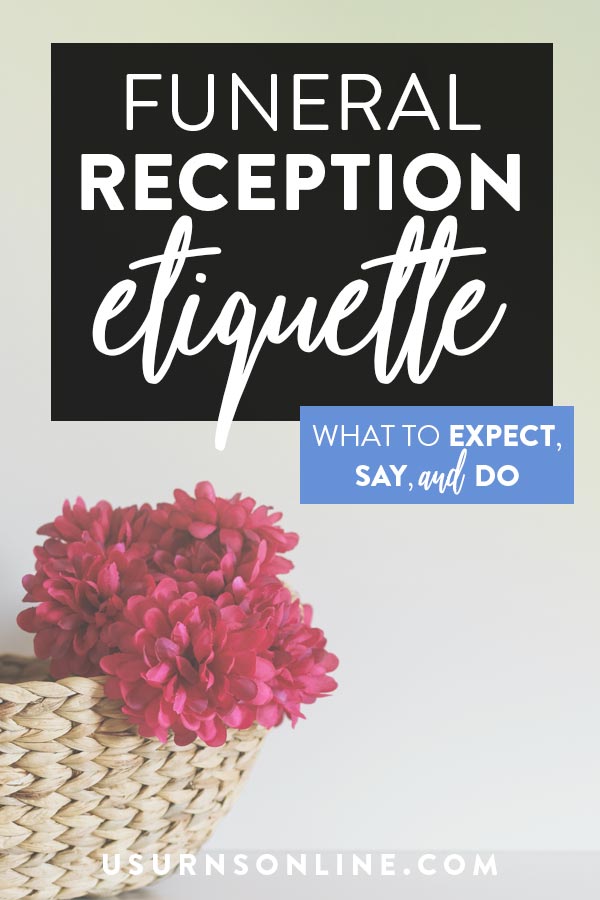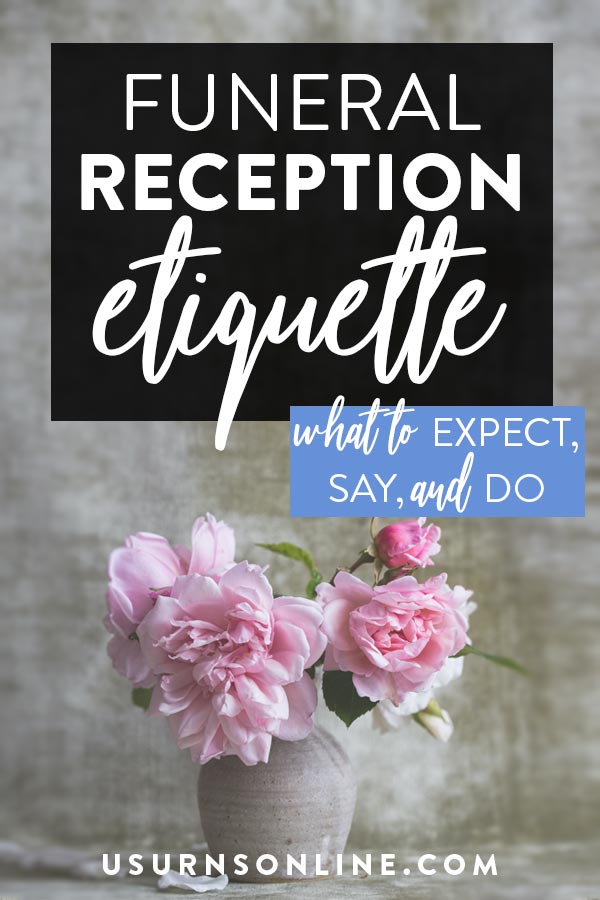Wondering about proper funeral reception etiquette? The answer is probably “yes” if you’ve just attended the service of a loved one, and now you’re on your way to the reception.
Perhaps you’re at a loss for words following the emotion of the day, and you’re not sure what to expect at the reception. You think it’s going to be a bit more laid back than the funeral, and you’re probably right.
But you still might have some questions about what to say and do at the reception. And of course you need the answers fast. We’re here to help with our funeral reception etiquette guide.
Below, we quickly yet thoroughly explain just what you can expect at the funeral reception, as well as what you should say and do once you get there.
Quick Funeral Reception Etiquette Guide
- What should I expect at the reception?
- What should I say?
- What should I avoid saying?
- What should I do?
What Should I Expect?
People Visiting & Socializing
Generally speaking, right when you walk in, you can expect for everyone who is already there to be standing around or sitting at tables, simply visiting with one another.
Food & Beverages
Receptions are defined by two things: 1) people gathering together, and 2) food. So you’ll probably see a table or two with food and drinks.
It may be a potluck (that would be mentioned on the invitation or social media post invite), or the family may have arranged simple appetizers, dessert, or a full meal with a catering service. So plan on coming ready to eat, but don’t always expect a full meal. Check your invitation for specifics.
Less Solemn Atmosphere
Urns Made in the USA
The air of solemnity that was so heavy at the funeral will most likely be somewhat dissipated by now. People are beginning to talk, tell stories and jokes, get reacquainted with old friends and family members, and enjoy food and drinks.
There may be a group of people standing close and offering comfort to the deceased’s next of kin and other family members.
No Casket
The decedent’s casket won’t be there. Following the funeral service, the body is typically buried or transferred to the cremation facility.
If cremation already took place prior to the funeral, the cremation urn may be in the reception area, perhaps on a decorated memorial table.
Common Funeral Reception Events
Besides the aforementioned, and depending on the funeral reception’s location, the following events may also occur at some point:
- Sharing. Attendees may be invited to share any warm memories they have of the deceased. Don’t worry, you don’t have to speak in front of everyone if you don’t want to.
- Photos. A photographer may take family photos. If you’re part of the immediate family, you’ll probably need to be in the photos. Otherwise you can decline any invitations to be photographed.
- Special Mini-Events. Many receptions have a slideshow playing on a screen; occasionally they will dim the lights and conversation pauses to watch the slides or video. A family member or officiant may say a few words. There may be an activity such as filling out “My special memory of you” cards. If the reception is being held at an outdoor venue, a dove, butterfly, or balloon release may be scheduled.
- Prayers. A minister or family member may say a prayer, or there may be a brief time for prayer and reflection. If you are not of the same faith tradition, you won’t be required to participate. However it is always respectful to stop talking, pay attention, and perhaps bow your head when prayers are occurring.
What Should I Say?
Now that we’ve gone over what you can expect, we can focus on your personal funeral reception etiquette.
Soon after you arrive at the venue, it’s a good idea to offer your condolences to the deceased’s family. This is especially important if you didn’t get a chance to at the funeral or visitation.
Along the way or afterward, you can also make conversation with anyone else you happen to know who’s also there. If you see someone you don’t know (and you’re a social butterfly), it’s perfectly appropriate to introduce yourself and ask them how they knew the deceased or the family.
If you’re not a natural social butterfly, don’t worry if speaking with others there feels awkward at first. Everyone feels a little strange at funeral events, including the ones who are in mourning.
It’s natural to worry over what to say to those who are grieving. Just make sure that you are sincere and your words come from a sympathetic place. In other words, be authentic.
If you need help figuring out exactly what to say at the reception, here are some ideas:
- “I’m so very sorry for your loss.” (A hug may be appropriate here.)
- “Is there anything I can do for you today or in the coming days?”
- “I can’t imagine what you’re going through right now, but I’m here for you.”
- “If you need anything at all, I’m just a phone call away.”
Keep in mind that in some instances, there are no words that you could say to ease the pain. Sometimes a long hug and cry together is what someone who’s grieving really needs. Read more tips on what to say to someone who is grieving here.
Related: What to Say at a Funeral? Finding the Right Words
What Should I Avoid Saying?
On the other hand, there are just a few things that you’ll want to avoid saying to the family at the reception:
- “I know exactly how you feel.” This sentiment may come from a good place, but not everyone will understand or appreciate it. No one but the bereaved know exactly how they are feeling.
- “He/she is in a better place now.” Again, this may seem like a common thing to say at a funeral or reception. But it only serves to remind the bereaved that their loved one is no longer with them, so you should avoid saying it.
- “You’re managing everything so well, I don’t know how you’re doing it.” While they may appear strong on the surface, the person you are talking to may just be trying to keep it all together until they’re alone and can truly begin to grieve.
Find out more about what not to say in What Grieving People Wish You Knew.
What Should I Do?
We’ve hopefully already answered this question with the information above, but let’s just break it all down for you here:
- Be present. Simply showing up to the funeral reception shows respect for the deceased and their family.
- Offer your condolences. Let the family know that you’re sorry for their loss, and that you’re here for them if they need anything at all.
- Introduce yourself to those you don’t know, and share together your memories of the deceased.
- Remember what to say and what not to say (see above).
- Be yourself. Does it goes against your nature to make small talk with everyone in the room, or to display great emotion when talking with anyone? You certainly do not have to. Do you like to make people smile? By all means, be friendly and even tell jokes – but keep with the spirit of the occasion and don’t go overboard.
You were searching for “funeral reception etiquette” when you stumbled across this article… But maybe what you were really searching for was the confidence that comes with knowing what to expect, say and do once you arrive at the reception venue. We hope that this article has provided you with it.
Have you ever been to a funeral reception that was really unique, or that had different events than those outlined above? We would love to know the details, so be sure to share them with us in a comment below.





